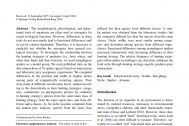Obsah
The morphological, physiological, and behavioural traits of organisms are often used as surrogates for actual ecological functions. However, differences in these traits do not necessarily lead to functional differences and/or can be context–dependent. Therefore, it is necessary to explicitly test whether the surrogates have general ecological relevance. To investigate the relationship between the hunting strategies of predators (i.e., how, where, and when they hunt) and their function, we used euryphagous spiders as a model group. We used published data on the diet composition of 76 spider species based on natural prey and laboratory prey acceptance experiments. We computed differences in the position and width of trophic niches among pairs of sympatrically occurring species. Pairs were made at different classification levels, ranked according to the dissimilarity in their hunting strategies: congeners, confamiliars (as phylogenetic proxies for similarity in hunting strategy), species from the same main class of hunting strategy, from the same supra-class, and from different supra-classes. As for niche position computed from the natural prey analyses, species from the same class differed less than species from different classes. A similar pattern was obtained from the laboratory studies, but the congeners differed less than the species from the same classes. Niche widths were most similar among congeners and dissimilar among species from different supraclasses. Functional differences among euryphagous spiders increased continuously with increasing difference in their hunting strategy. The relative frequency of hunting strategies within spider assemblages can, therefore, influence the food webs through hunting strategy-specific predator–prey interactions.



